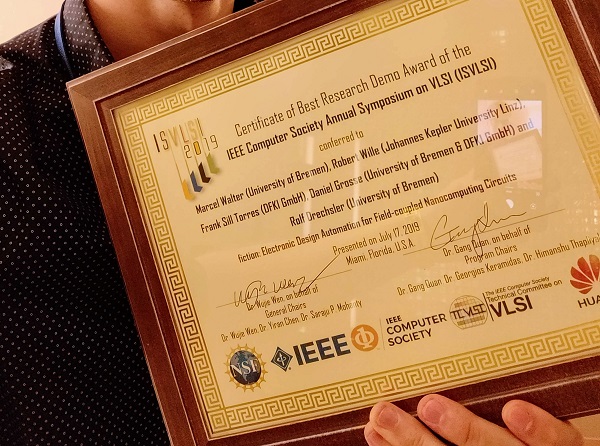Among the various software developed at the JKU, the software program "fiction" enables a fully automated design of future-oriented nanotechnologies.

Computer technology is on the verge of upheaval. In the near future, new technologies will replace conventional chips. This, however, also requires proper design tools. These tools and other technologies are currently being developed at JKU. The Bremen scientists were presented with the Best Research Demo Award at the IEEE Computer Society Annual Symposium at the VLSI (ISVLSI) in Miami (USA) for their "fiction" software, which enables the fully automated design of future-oriented nanotechnologies.
Computer chips, such as those found in smartphones and laptops, are becoming ever smaller and more powerful. The energy output per unit area, however, is also greatly increasing. Modern processors have already reached the energy density of a nuclear power plant and without the proper cooling, they would burn out as soon as they are put into operation. Computer scientists agree that in the near future, the limits of a conventional chip’s technical feasibility will be reached as it is based on silicon transistors.
Nanotechnologies are a promising alternative as they work with electrical and magnetic fields instead of current flow. This not only greatly reduces energy consumption, at the same time it also turns the way computer chips have been designed in recent decades completely upside down, and long-established methods can no longer be used. Researchers around the world are now not only driving the development of nanotechnology forward, but they are also working on innovative design tools.
Successful research on innovative nanotechnology design methods is also being conducted in Linz: Together with scientists from the University of Bremen and the German Research Center for Artificial Intelligence, researchers at the Institute for Integrated Circuits at the Johannes Kepler University of Linz have developed "fiction" software. The software can create fully automatic practical, relevant designs instead of laboriously "by hand". The software, which is also available online, brings interdisciplinary expertise in the fields of nanotechnology and computer science together. The scientists were presented with the Best Research Demo Award for their design tool at the IEEE Computer Society Annual Symposium on VLSI (ISVLSI) which took place on July 15 - 17, 2019, in Miami (USA).








